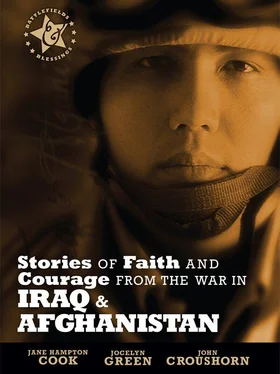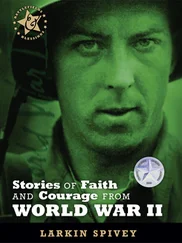These graves were very shallow. Sand thinly covers the skulls and bones that remain. From a distance, these graves look like dimpled sand dunes against an otherwise smooth terrain.
Small signs, as crude as a typical handmade yard sale sign in America, mark the graves. With Saddam dead, Iraqis felt free to the mass graves. They hoped to find even just a remnant such as the sole of shoe of their loved one, and carry it home as a reminder of the one lost.
The uncovering of these mass graves revealed that in the end, Saddam’s evil could not be kept a secret. The evidence was obvious to all who visited these remote desert dunes.
Prayer:
Thank you that you are a God of justice who knows all things.
“He reveals deep and hidden things; he knows what lies in darkness, and light dwells with him.” (Daniel 2:22)
January 25
BRICKS AND LIONS
Lt. Sean McDougal, United States Navy
“I took thousands of pictures in Iraq, especially of my tour of Babylon. I have very visible proof that there are four ages of Babylon. The wear and tear on the bricks show all four ages perfectly,” Navy Lieutenant Sean McDougal noted.
McDougal also took pictures of the Saddam Hussein bricks. Saddam ordered workers to reconstruct King Nebuchadnezzar II’s massive palace. One brick in the center of each wall was inscribed with praises of Nebuchadnezzar. Saddam also had a brick placed in the center of each wall. These bricks proclaimed him as the fourth emperor of Babylon and a descendant of Nebuchadnezzar. By some accounts Saddam used as many as sixty million bricks to rebuild Babylon.
“Saddam saw himself as the fourth person to rebuild Babylon. All that made me see Daniel Chapter 2 in a whole new light.”
Daniel interprets a dream for Nebuchadnezzar and details the four emperors of Babylon. The fourth kingdom had feet made of iron mixed with clay. “As iron is strong but brittle and does not mix with clay, the fourth emperor will fall quickly and the nation of Babylon will not be united and will split up.”
That is exactly what Saddam tried to do and he fell quickly. McDougal visited Basra’s underground prison, which many Iraqis claim as the lion’s den where Daniel was held.
“The tour guide told us of the story of Babylon and how the Nazis came in WWII, and took everything. The only statue left was what they call the Lion of Babylon, or to some, the Lion of Daniel,” McDougal said. The guide’s account seemed ripped from an Indiana Jones movie.
The tour guide claimed that the statue is the only statue of a human and lion in which one is not trying to kill the other. “The Lion of Daniel” shows a lion standing over a man as if protecting him.
Whether or not the Basra prison was the site of Daniel’s imprisonment, there’s no doubt that this prison was a dark, dark place under Saddam’s rule. Many service members have taken pictures and heard stories that document the maze of evil.
The Bible refers to lions nearly 120 times, proving the presence of lions in the ancient Middle East. Lions are now extinct in Iraq. And thanks to the bravery of United States service members such as Sean McDougal Saddam Hussein’s evil reign is also extinct.
Prayer:
Father, thank you for breaking the chains of evil.
“The king was overjoyed and gave orders to lift Daniel out of the den. And when Daniel was lifted from the den, no wound was found on him, because he had trusted in his God.” (Daniel 6:23)
January 26
WHATEVER PROVIDENCE BRINGS
Lt. Daniel Nichols, United States Navy Chaplain
(A reservist goodbye email to his United States Department of Labor colleagues before joining Operation Iraqi Freedom in March 2003)
Whatever providence brings, I can claim to have found such meaning and satisfaction in my employ among all of you.
I am one of thousands. Just one among tens of thousands (reservists) called-up in the past weeks and months, and one of countless thousands for whom the oath we swore, to protect the United States Constitution from enemies foreign and domestic, takes on harsh new reality.
I follow in the steps of far greater men men and women sent from these shores to carry freedom’s torch to places where liberty’s light wanes dim. And when I return, I will bear a title I shall cherish more than any other I have yet attained: United States Veteran.
I suppose it is the right of those afforded such honor to offer a departing word, and if not, your forbearance is requested. You should know that we who go, and those who’ve gone before, are ordinary people. We do not share a single color of skin, an ethnic origin, or a common creed save that of leaving no fallen behind.
Beneath each helmet and uniform stands a brother, a sister, a father, a mother, a son, a daughter, or a friend. As a chaplain, I have shared in their common stories and walked beyond the thin line of bravado to see the human being beneath. But though these are ordinary people, they are not common. In my experience, I have seen no hereditary trait that presupposes a person toward bravery. And these are courageous people, not for staring death in the face, but for embracing duty when called and struggling forward against all odds for the sake of a few intangible values. Values such as liberty and human dignity, values without which life on earth would bear no worth at all.
I know that all of you will strive with diligence and dignity in your various tasks. There is but one thing I would request before trading my coat and tie for boots and a pack: honor the veterans among you and among the people you serve. Honor them not simply with a smile or a clap on the back, but with sensible policy and mindful execution of your duties. The cost of service to country is often very high and with lasting consequences for those who go and loved ones who remain.
I wish all of you tremendous success and look forward with hope to the privilege of serving with you again.
Prayer:
Thank you for those veterans who have served this nation.
“You will increase my honor and comfort me once again.” (Psalm 71:21)
January 27
KEEP IT SIMPLE
Lt. Daniel Nichols, United States Navy Chaplain
(A devotional given to members of the Navy and Marine Corps in June 2003, during Operation Iraqi Freedom.)
Jesus of Nazareth understood people, and he certainly understood me very well: I need things to be plain and simple. Mind you, this doesn’t make a person any less of an intellectual. Indeed, many intellectuals have a suspicious habit of convoluting their discussion with wise sounding phrases and fancy words.
But there is a difference between polish and power.
We in this Navy and Marine Corps team have our moments of polish and shine; but not without having earned it first. Indeed, there is something to be said for our shared habit of being succinct that surpasses concepts like efficiency and finds itself rooted in the example set by Jesus so many centuries ago.
That is the difference between polish and power.
Think back, if you will, to the days preceding your coming here, preceding the war. Apart from the jitter in your gut, most likely there was a sense of tradition, of history, of feeling part of something larger than yourself. If I’m wrong just try to follow me, but I’m thinking many of you had visions of yourselves accomplishing heroic deeds and winning much acclaim for family, God, country, and corps for the majority of Marines out there.
Those imaginings were not based upon arrogant presumptions. They were based upon discipline, training, and courage all enhanced by experience. My guess is, you weren’t thinking about accomplishing whatever tasks might be set before you using complex formulas or grand schemes.
Читать дальше












